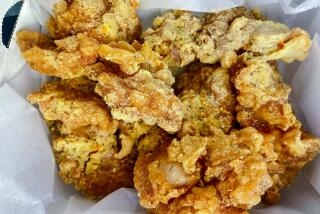Urban Fish Market Owners’ Brand of Korean Blacktalk Keeps Customers Satisfied
- Share via
WASHINGTON — At the Mid-City Fish Market and Carryout in downtown Washington, where only one of the four Korean owners speaks fluent English, you’d expect a clash of cultures when the place fills up with black customers, many of whom sound as if English were their second language, too.
But after seven months in business, the owners have learned to decipher urban intonation patterns and appear to have developed a mesmerizing, sing-song style of Korean blacktalk.
“Gimme a steakachee samitch,” a customer orders over a cacaphony of chatter.
“One steakachee wif eberting on it comin’ up, sugapie,” a waitress responds politely.
“Yo,” the customer responds with a smile.
On a corner once rife with the vices of urban street life, the Mid-City Market has undergone a dramatic transformation from a decaying, black-owned carryout where “wings and things” usually meant more things than wings, to a Korean-owned carryout where fresh food is served on spotlessly clean premises.
The fact that good, inexpensive food is served to people who are hungry and don’t have a lot of money overshadows most ethnic differences. But in a town where tensions between blacks and Koreans have resulted in confrontations and protests, the Mid-City Market owners take little for granted.
This does not mean putting bulletproof glass around the counter. Indeed, it means just the opposite.
“I want to give the customers a family feeling, make them feel like they are home,” said Lisa Kim, 35, who learned English at the University of Maryland in Baltimore after coming to the United States seven years ago.
“I say, ‘Howyadoin, honey,’ and most of the guys will say, ‘Okay, baby,’ and smile. So we don’t have much problem.”
Sometimes, however, elderly black customers get irritated when an employee who does not speak English well says to them, “Come here,” or “Go there,” without adding, “please.”
“We mean no offense to them,” Kim said. “They are nice people, and we would not be rude to them. It’s just that English is the hardest language in the world to learn, and sometimes we forget the nuances.”
When things do get out of hand, for instance, when the neighborhood wino stumbles in and demands food that he has no money to pay for, Kim’s 5-foot-5-inch, 145-pound husband, Jason, also 35, steps from behind the fresh-fish display case -- without his cleaning knife -- to shoo the man away.
Sometimes Jason relents and lets the man have some food. But if the man starts cursing and flinging cigarette butts on the floor, Jason signals for his departure with the kind of penetrating stare you’d expect from a man who spent three years teaching karate to U.S. troops in Vietnam. It works, even on winos.
The result is an establishment that is rapidly gaining the respect of the community it serves, and mass lunch orders are frequently called in from places such as the telephone company and the Embassy of Japan.
Like some Korean merchants, Lisa, Jason and the other owners, Judy Choe, 33, and Kim Han, 25, came to Washington with little money. They worked at jobs as a computer operator, dental technician, cook and supermarket clerk until they saved enough money to make a down payment on a store.
These days the crew gets up at 4:50 a.m. each day and makes a nearly hour’s drive from Laurel, Md. Then it’s cooking, cleaning and serving until 9 p.m. Some nights they make it back home in time to catch a television show before going to bed.
“Sometimes I feel that I can’t enjoy myself because I’m always serving customers,” Lisa Kim said.
But then regular customers start showing up, including the neighborhood barber, policemen and a car mechanic. Better yet, new faces show up in the crowd, saying they had heard how good the food was.
Lisa’s eyes light up, and it becomes clear that this is what she enjoys.
“Gimme two row beef samitches and one Eyetalian cold cut,” a customer commands.
“Wif eberting, hon?” a waitress asks with a smile.
More to Read
Eat your way across L.A.
Get our weekly Tasting Notes newsletter for reviews, news and more.
You may occasionally receive promotional content from the Los Angeles Times.










